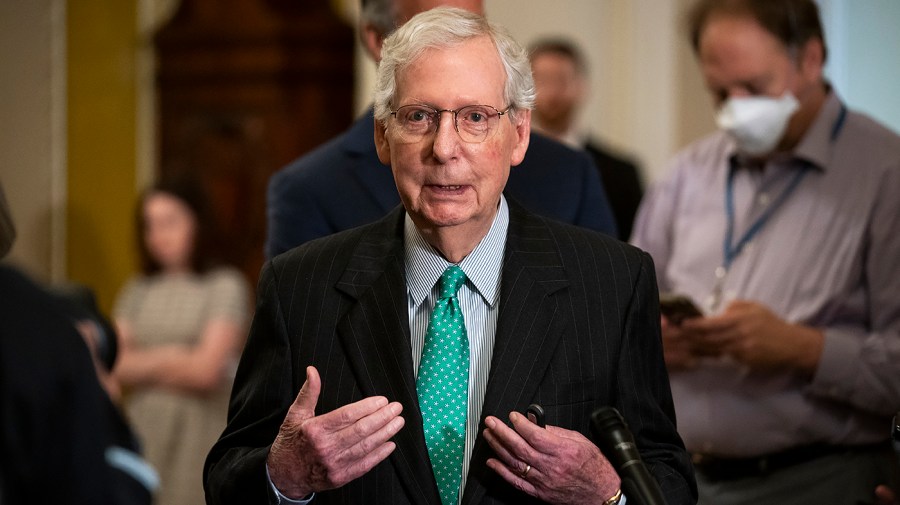
Sen. Mitch McConnell’s (R-Ky.) decision to conclude his storied political career marks the end of an era for Senate Republicans, especially as the longtime GOP leader increasingly signals he’s a maverick unafraid to cross President Trump in his second term.
McConnell has already voted against three of Trump’s Cabinet picks — Health and Human Services Secretary Robert F. Kennedy Jr., Director of National Intelligence Tulsi Gabbard and Defense Secretary Pete Hegseth. He was the only Senate Republican to vote against Gabbard and Kennedy.
Trump’s bellicose rhetoric toward Ukraine this week put one of McConnell’s most important issues on the front burner. While he has been muted in any criticism toward Trump on his blaming Ukraine for the Russian war, it is difficult to see the longest-serving Senate leader in history staying quiet.
Colleagues expect him to speak up, and they describe an elder statesman who is ready for a new chapter but is also willing to sound off on his values and priorities.
“He’s staying in it. He could easily take a two-year nap, but he’s not,” Sen. Kevin Cramer (R-N.D.) said.
“Mitch McConnell’s a guy who’s pretty comfortable in his place and very supportive of new leadership. But at the same time, he’s not going to just ride into the sunset without at least one more good gunfight,” Cramer continued. “Maybe there will be two or three of them.”
McConnell’s role is likely to require a balancing act as he tries to stamp his own imprint on matters without complicating the picture for his successor, now-Senate Majority Leader John Thune (R-S.D.). Thune served as McConnell’s No. 2 during the final six years of his time as leader.
Although he’s not technically on Thune’s leadership team, he remains an informal adviser to his replacement and wants to see him flourish not only for the sake of the team, but for his own legacy.
“He’ll do whatever he can to help Thune be successful. He really does view Thune’s success as something he’s got a vested interest in,” one Senate Republican told The Hill.
That means supporting the team, McConnell himself has indicated, even if the team is led by a president who McConnell has personally battled.
“I expect to support most of what this administration is trying to accomplish,” McConnell recently told “60 Minutes.” “So, what happened in the past is irrelevant to me.”
McConnell played an integral role in cementing the 6-3 conservative majority on the Supreme Court, which conservatives widely view as a hallmark of Trump’s first term in office.
He was also the Senate GOP’s political tactician who helped hand the party majorities on multiple occasions, including the one Republicans enjoy today.
Yet McConnell is not a part of Trump’s MAGA movement, which at times seems to be growing in influence at his expense. There are more GOP senators in the Senate today who are more closely aligned with Trump than McConnell compared to a decade ago — or even two years ago.
“It’s impossible to exaggerate his influence on the institution,” Cramer said. “It’s also really clear that his influence has waned in recent months and years, and that the change is afoot.”
The fight to succeed McConnell will reflect that change in the Republican Party at large.
Two of the GOP’s leading contenders are former Kentucky Attorney General Daniel Cameron and Rep. Andy Barr (Ky.) — both of whom previously have worked for McConnell in various capacities. But when it comes to them winning the seat, it’s Trump’s blessing that will likely matter the most as they are both already trying to put themselves in pole position for his support.
“President Trump is the single most important force in any Republican primary in any state in the country,” one Republican operative said.
Thursday night’s vote-a-rama to advance the Senate’s budget resolution served as a prime example of how McConnell may navigate the next two years.
Even as he voted with the GOP throughout the 10-hour session, McConnell took the administration and Hegseth to task over a push to slash the Pentagon’s budget by 8 percent over the next five years. He also maintained that any monies approved for defense in the coming reconciliation push should be in addition to what is appropriated in the coming spending bill.
“[Reconciliation] has to be a supplement to full-year appropriations. It can’t be a substitute. If we’re serious about restoring lethality and peace through strength, we need to start spending more on defense than [President Biden] did, not less,” he said in a statement, adding that the potential for a full-year continuing resolution (CR) would be harmful. “The military services are worried about what a full-year CR will do to defense. So am I.”
After announcing he would no longer serve as the Senate GOP leader last year, McConnell made clear he would not be going quietly in the night, particularly over matters surrounding national defense and the U.S.’s role in the world amid what he believes is a retreat by the Trump and MAGA universe.
With that in mind, he took over the gavel of the Appropriations Subcommittee on Defense, ensuring that he will have some influence.
While McConnell is no longer the party’s leader, his colleagues still listen to him, too.
One Senate Republican pointed to the weekly Senate GOP luncheons. McConnell no longer runs the show and doesn’t speak at every meeting — but when he does, usually about national security or a procedural matter, antennas go up.
“He’ll say it like, ‘here’s one guy’s input,’” the member said. “But of course everyone’s listening.”
“He’s settling in, and he’s only had a brief period to do it,” they continued, adding that he’s acclimating to his new position of being “a rank-and-file member with a lot of weight.”
McConnell was caught by multiple reporters following his Thursday floor speech joking to his colleagues that “these are the new moderates” while standing alongside Sens. Susan Collins (R-Maine) and Lisa Murkowski (R-Alaska).












